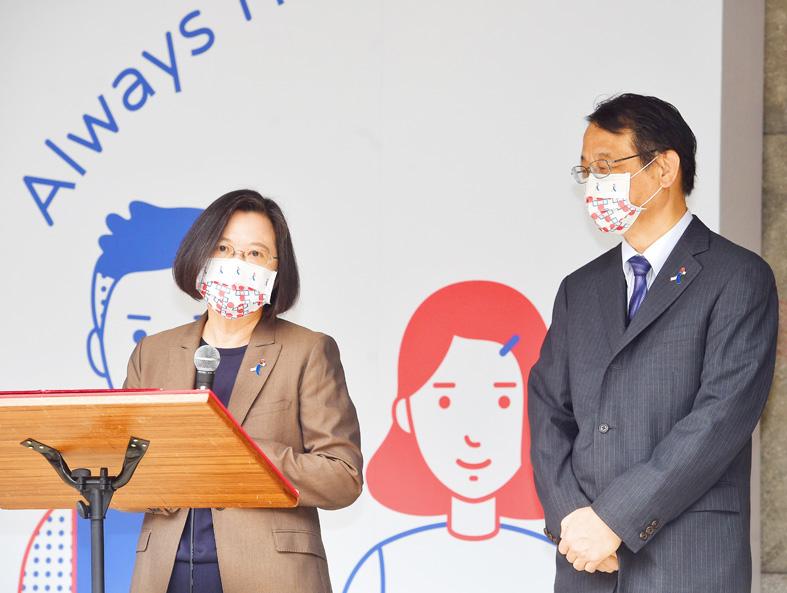President Tsai Ing-wen (蔡英文) yesterday slammed a referendum to activate the mothballed Fourth Nuclear Power Plant, citing the lack of a long-term storage facility for spent fuel rods.
The referendum to activate the plant in New Taipei City’s Gongliao District (貢寮) is scheduled for Aug. 28, while another referendum proposal to move a proposed liquified natural gas (LNG) terminal off the coast of Taoyuan is also expected to clear the threshold to be held.
Tsai made the remark at an event in Taipei yesterday marking Taiwanese-Japanese friendship in the wake of the 2011 Tohoku earthquake and tsunami.

Photo: Liu Hsin-de, Taipei Times
The ruling and opposition parties had for many years debated the merits of starting operation of the power plant, but all have come to accept that no local government is willing to host a storage facility for spent fuel rods, she said.
Concerns over safety and cost of nuclear energy make operating the plant not viable, Tsai said.
“We will accelerate the transformation of energy generation, and give Taiwan a safe and stable power supply,” she said.
The government has proposed that after the suspension of nuclear power generation in 2025, 50 percent of Taiwan’s energy should come from natural gas generators, 30 percent from coal-fired units and 20 percent from renewable sources. According to Taiwan Power Co data for last year, 12.7 percent of the nation’s energy comes from nuclear power, 78.5 percent from coal, 5.8 percent from renewables, and the rest from other sources.
Taiwan has four nuclear power plants. The Jinshan Nuclear Power Plant, the Guosheng Nuclear Power Plant and the mothballed Fourth Nuclear Power Plant are in New Taipei City, while the Ma-anshan Nuclear Power Plant is in Pingtung County.
When asked whether he would support the referendum to start the Fourth Nuclear Power Plant, New Taipei City Mayor Hou You-yi (侯友宜) on Wednesday reiterated that New Taipei City does not want to house a facility for spent fuel rods in addition to the plant.
“My position on the issue has been consistent. We cannot make use of nuclear power if we do not have facilities for radioactive waste,” Hou said. “Nuclear waste disposal is the biggest problem of New Taipei City.”
While the central government has started work to decommission the more than 40-year-old Jinshan and Guosheng power plants, it has never told New Taipei City residents if spent fuel rods would remain in the city, he said.
Meanwhile, the Presidential Office responded to a local media report accusing Vice President William Lai (賴清德) that he had pushed through an environmental impact assessment for the LNG terminal project without due dilligence.
The Chinese-language Web site the Journalist (新新聞) reported that Lai had angered environmental groups after the government had to shelve a project to expand the coal-fired Shenao power plant in New Taipei City’s Ruifang District (瑞芳), citing an annamed senior government official.
Presidential Office spokesman Xavier Chang (張惇涵) said that the report was based on a single unnamed source, as well as political speculation and exaggeration.
“All policy decisions were made after all involved departments and ministries were consulted,” he said. “The environmental impact assessment has been conducted as stipulated by law.”

Taiwanese can file complaints with the Tourism Administration to report travel agencies if their activities caused termination of a person’s citizenship, Mainland Affairs Council Minister Chiu Chui-cheng (邱垂正) said yesterday, after a podcaster highlighted a case in which a person’s citizenship was canceled for receiving a single-use Chinese passport to enter Russia. The council is aware of incidents in which people who signed up through Chinese travel agencies for tours of Russia were told they could obtain Russian visas and fast-track border clearance, Chiu told reporters on the sidelines of an event in Taipei. However, the travel agencies actually applied

Japanese footwear brand Onitsuka Tiger today issued a public apology and said it has suspended an employee amid allegations that the staff member discriminated against a Vietnamese customer at its Taipei 101 store. Posting on the social media platform Threads yesterday, a user said that an employee at the store said that “those shoes are very expensive” when her friend, who is a migrant worker from Vietnam, asked for assistance. The employee then ignored her until she asked again, to which she replied: "We don't have a size 37." The post had amassed nearly 26,000 likes and 916 comments as of this

US President Donald Trump said "it’s up to" Chinese President Xi Jinping (習近平) what China does on Taiwan, but that he would be "very unhappy" with a change in the "status quo," the New York Times said in an interview published yesterday. Xi "considers it to be a part of China, and that’s up to him what he’s going to be doing," Trump told the newspaper on Wednesday. "But I’ve expressed to him that I would be very unhappy if he did that, and I don’t think he’ll do that," he added. "I hope he doesn’t do that." Trump made the comments in

Tourism in Kenting fell to a historic low for the second consecutive year last year, impacting hotels and other local businesses that rely on a steady stream of domestic tourists, the latest data showed. A total of 2.139 million tourists visited Kenting last year, down slightly from 2.14 million in 2024, the data showed. The number of tourists who visited the national park on the Hengchun Peninsula peaked in 2015 at 8.37 million people. That number has been below 2.2 million for two years, although there was a spike in October last year due to multiple long weekends. The occupancy rate for hotels